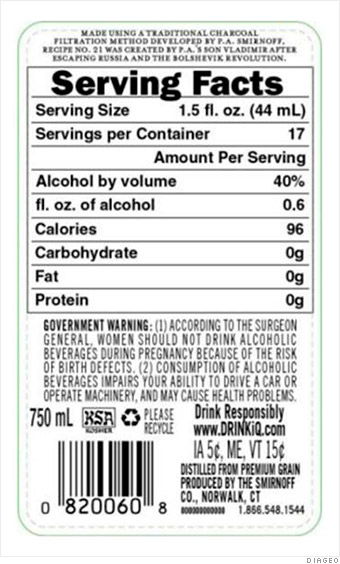
"Guinness is good for you!" has long been a slogan for the popular Irish stout and the company will now let you come to your own conclusion by putting nutrition labels on its containers.
Serving beer bottles with nutrition labels similar to those found on packaged food is a first in the alcohol industry and is being done voluntarily, according to Diageo (DEO) CEO Ivan Menezes. Diageo owns Guinness as well as Johnnie Walker, Smirnoff and Captain Morgan, and several brands of beer and wine. It sells in 180 countries around the world.
It's the first time information on carbohydrates, calories, fat and protein content in alcoholic beverages will be included on a "serving facts panel," said Diageo spokeswoman Zsoka McDonald. Previously, the company was not allowed to print such information on labels, she said.
The company said it will label drinks with the amount of alcohol contained in a given serving size, as opposed to the alcohol content per 100 milliliter, the standard for nutrition labels in Europe. Measuring alcohol and nutrition content that way is "misleading" because drinks vary widely in terms of size, according to Diageo.
Guinness has 35.2 calories per 100 milliliters, according to the brewer's website. That translates to about 140 calories per U.S. pint, which is 16 ounces. By contrast, a 12 ounce bottle of Budweiser contains about 145 calories.
"Currently, there is no obligation to provide such information in markets worldwide, but we know that consumers are increasingly discerning about what's in their glass," Menezes said in a statement.
Related: U.K. budget has tax cut for beer makers

Diageo said it is working with the European Union to come up with a standard for labeling alcohol and nutrition content that is easier for consumers to understand.
Related: Guinness returns to sponsor N.Y.'s St. Patrick's Day Parade
"Providing both the nutrition and alcohol content of alcohol drinks, in an easy to understand 'per serving' format, is a major improvement on the confusing current system, where there are different measurements of alcohol units across the EU," said Ian Duncan, a Scottish member of the European Parliament.
In the United States, alcoholic beverages are regulated by the Bureau of Alcohol, Tobacco, Firearms and Explosives, not the Food and Drug Administration. That means alcohol hasn't been subject to the same nutrition labeling requirements that most foods are.
